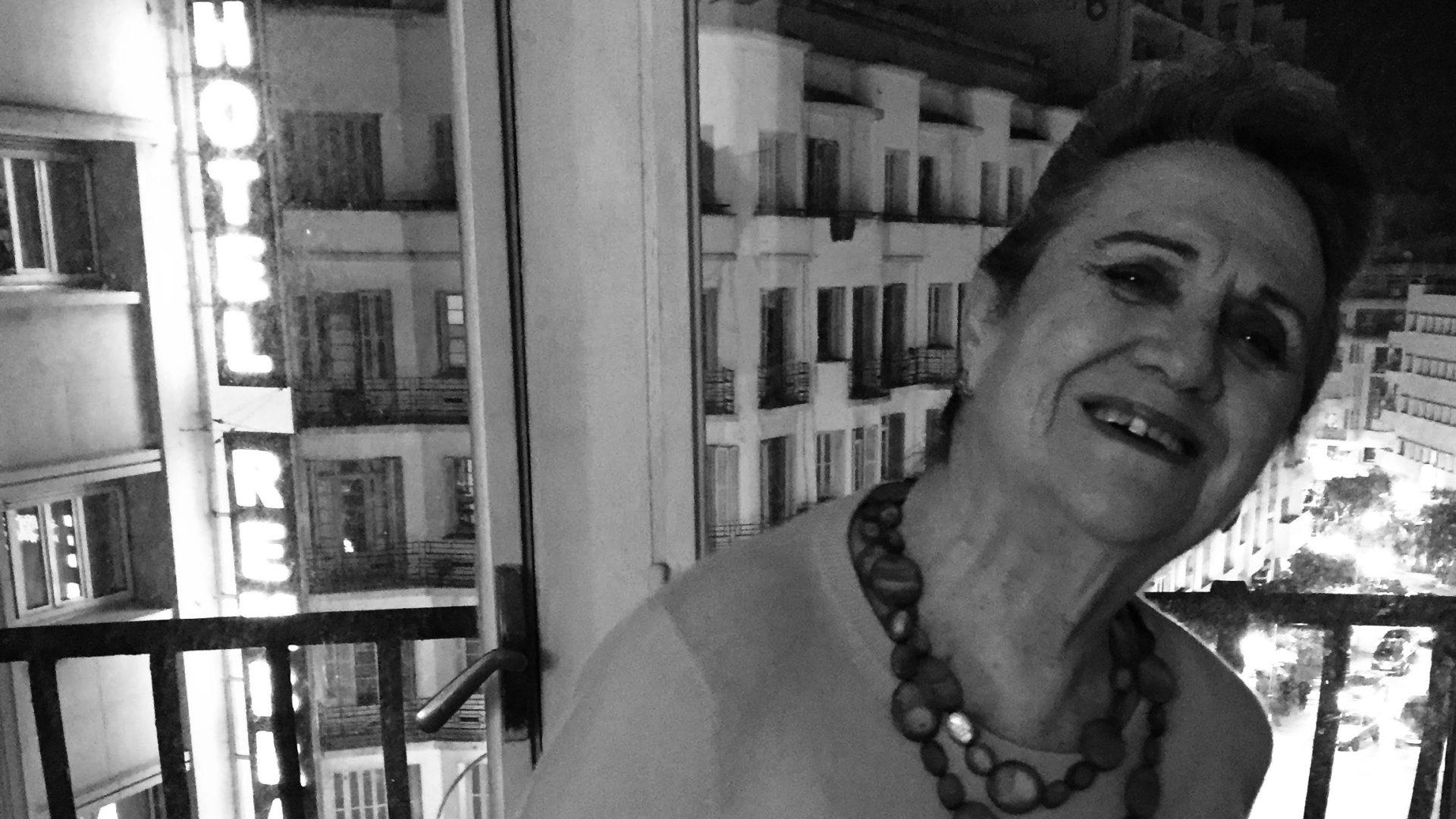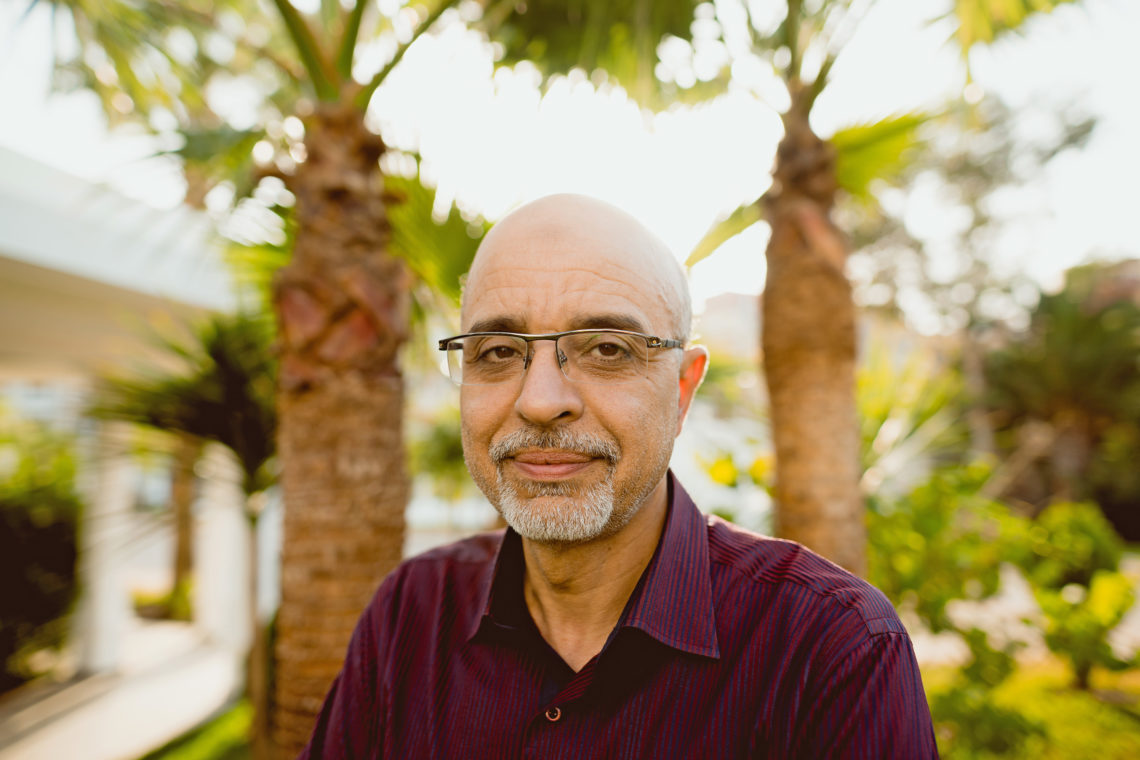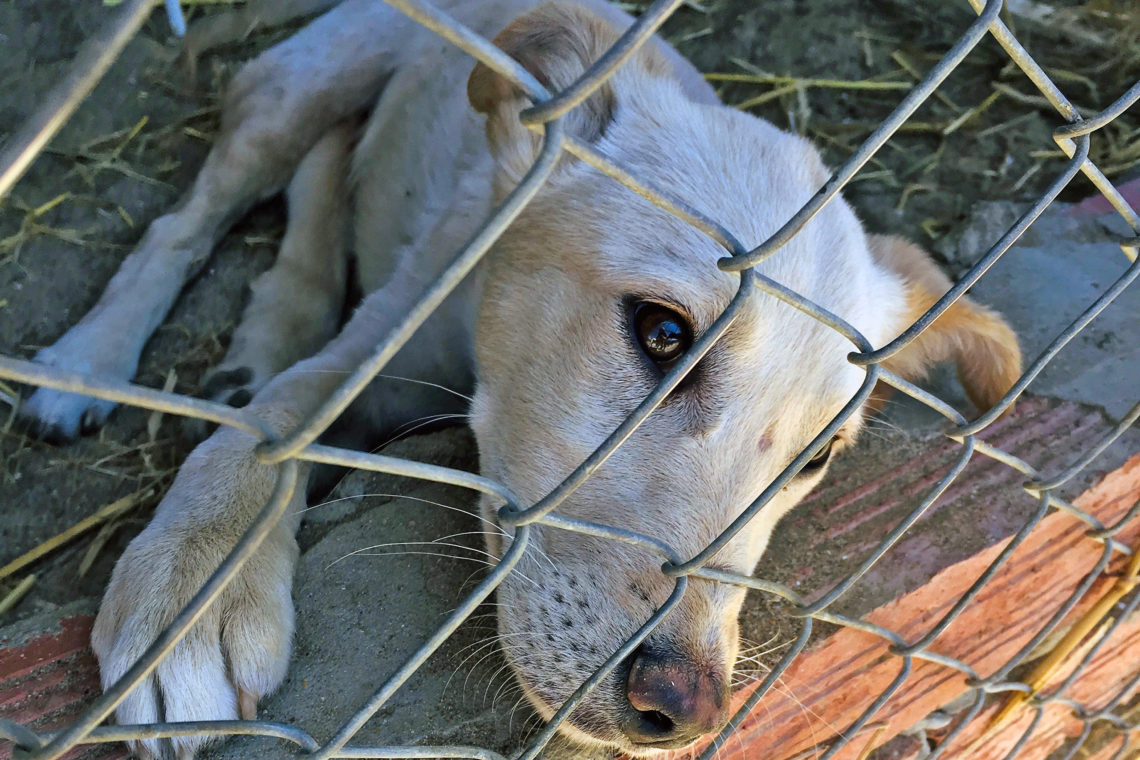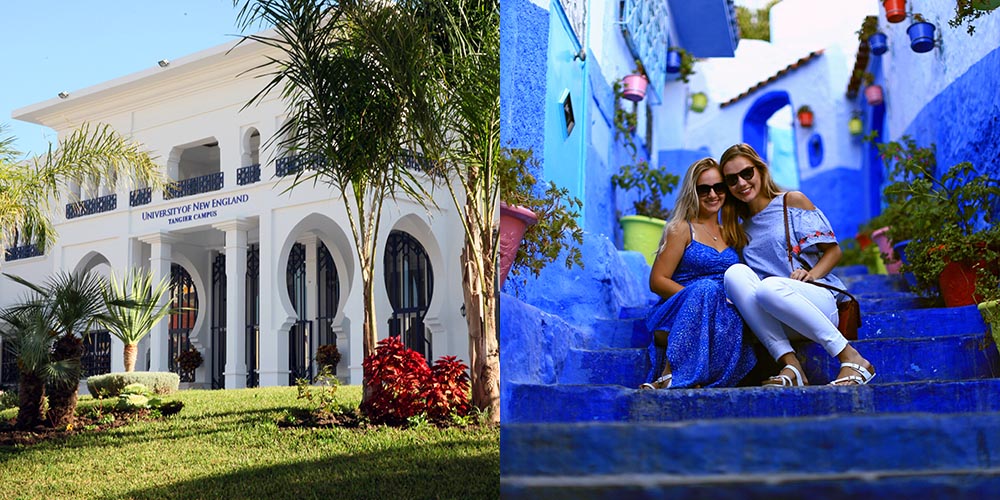Waiters scurried around us to push the tiny round mahogany tables together, as is seemingly tradition now on these small group excursions of ours. The older of the two waiters seemed a bit overwhelmed and, judging by the many empty tables, I figured we were the most customers he’d had in years. As I was trying to cross the language barrier to order a cappuccino, and failing at it, our guest of honor appeared at the foot of the stairs: the esteemed Rachel Muyal of Tangier, queen of bookshops, saint of creativity. The petite old woman carried herself like royalty. I noticed her gentle eyes scanning the room for a place to sit, so I offered her the open seat next to mine, which she accepted with a half-smile. Rachel took a moment to study each of us, as if surveying her audience. Her contagious smile, painted with red lipstick, quickly spread onto the faces of everyone seated at the table.
“Well, where should we start?” she asked.
The Champs-Élysées Café, which Rachel told us has been around since 1956 and once served up the city’s finest cocktails, was resplendent even in its dilapidated state. The finely detailed holdings grasped at the aesthetic of its namesake, the famous Parisian avenue. The grand crystal chandelier hanging from above and marble floors below sent my imagination backwards in time to elaborate parties, and women sipping champagne in evening gowns around the fountain in the center. From there, my mind wandered to the smoky balconies that surrounded the lower level. Now, the vintage hall is mostly empty. The fountain’s water is gone, waiting for another booze-filled party that will never come.
Rachel’s confident voice snapped me from my daydream.
“I will only say what I have to say once; I will not repeat myself.”
An awkward silence filled the cafe for a moment, each of us shooting shocked glances at each other.
“I do not say things twice,” she affirmed, lifting her hands in emphasis.
She turned and, switching to French, called for the waiter. I used the time to pull myself together. I grabbed my pen and paper and got ready to write.
Rachel’s story began in the year 1492. Queen Isabella and Ferdinand II are sitting on the throne in Spain, and the Alhambra Decree is about to be signed into law, a product of the ongoing Inquisition. Jews are given two options: within three months, they must either convert to Christianity or leave. Though the second option is cruel and inhumane, many of the Spanish Jews flee Spain rather than betray their faith. A condition of leaving is also that valuables, such as gold, silver, and horses, must be left behind in Spain. Many of the families take what they can and set off for the Maghreb.
Rachel’s ancestors were a part of that forced migration, settling in Tangier. The rest, you might say, is history.
Tangier was a different city eighty-four years ago when Rachel took her first breath. Beginning in 1924, only about ten years before she was born, Tangier became an international free zone, jointly controlled by France, Spain, England, and several other nations. At the time it had only about 60,000 inhabitants, including a thriving Jewish community that numbered 17,000. Rachel described the city during this “Old World” period as prosperous and unique. After her mother died when Rachel was two, she and her three brothers were raised by their pious aunt and uncle who instilled in them traditional Jewish values and beliefs.
All was well in her childhood until the world plunged into darkness.
On June 14th, 1940, the Germans took Paris while Franco’s Spanish troops descended on Tangier. A little less than nine miles away from continental Europe, Rachel and her family were swept up into the storm of the Second World War. Nazi anti-Semitism spread like a plague across Europe and North Africa. French schools under Vichy control became “strict,” according to Rachel, especially in southern Morocco where Jews were no longer allowed to attend public schools. A cloud of fear and uncertainty hung over the community, even though they tried to live normal lives. Axis leaders pressured King Mohammed V to turn over lists of Jewish families. As sovereign, he vowed to keep all Moroccans safe and refused to turn over the lists. Rachel brightened up, noting that the King should “still be praised” for his actions.
In 1948, three years after the tides of war changed and the Axis powers fell and Israel gained its independence. Symbolically, Israel was the Phoenix rising from the ashes of Nazi atrocities. To gain in population, Israeli agents traveled to the Maghreb to “recruit,” as Rachel put it, Jewish residents. Morocco, especially the southern regions that had suffered the brunt of the Vichy’s abuse, was their focal point. Morocco’s population of 300,000 Jews declined rapidly as Jews left not only for Israel, but also Canada, France, and South America.
“As for me,” Rachel said, “I’ve never wanted to live anywhere but Tangier. “I want to be buried here,” she boldly proclaimed.
I was curious why Rachel, a well-traveled cosmopolitan, decided to stay behind in Tangier.
“It is my home,” she said with a shrug, her finger tracing the rim of her cup of tea. “There were 17,000 of us in Tangier, then we were 6,000, and over time we were fewer and fewer. Guess how many now?” she asked, though she didn’t pause to let us guess. “Thirty-four.”
A moment of silence hung over the mahogany tables.
“So there’s only thirty-four of you?” someone asked.
Rachel slowly nodded her head.
“Yes, thirty-four.”
There are so few left, and she can list the exact double-digit numbers of the populations in cities like Rabat and Casablanca. Rachel caught herself mid-thought and chuckled, letting us in on the secret that men are “imported” from neighboring countries to the local temple on holidays for traditional practices, as there are not enough to carry out the ceremonies. Today, Israel offers programs for Moroccan-Israelis to travel back to Morocco and see where their stories began. The mainly second and third generation Israelis, Rachel says, are “happy” with what they find in Morocco. “They’ll come to the city and say, “Wow, this is it! It’s exactly what my mother told me about!”
She should know — Rachel has lived in Tangier long enough to see society and culture blossom and decay in various ways.
I was curious to hear more about the Tangier Rachel knew over half-a-century ago. “Back then, Tangier was mentioned in the same breath as New York, Paris, or London,” she said. In her twenties at the time, it seemed the entire world was at her feet in this unlikely paradise. Everything, from the mixed culture, distilled and imported by the different nations and kingdoms that had once ruled over the city, to the “marvelous winds from the Mediterranean and Atlantic to purify the air,” and the proximity to Europe — all these factors have made Tangier something unique. Rachel described the city as a “meeting place” for people of all backgrounds and convictions.
The town became a “convenient place” for American beatnik writers such as Paul Bowles and William Burroughs to write their masterpieces. Rachel remembers Bowles being “very good” to the people of Tangier during his time here. She recalls how he helped the poor, illiterate youth living on the cruel and unforgiving cobblestone streets to tell their stories.
Throughout her life, Rachel valued travel and had the opportunity to do so. From Mexico to Rome, Spain to the US, and even a communications job in New York City, she was a free and independent woman, held down neither by men nor family expectations.
She told us a story of her job in New York. The president of her company called Rachel into his office. Clad in a miniskirt and knee-high boots, she strutted to his desk like the confident woman she was, and still is. The air was thick with anticipation. Was he going to fire her? Had she done something wrong?
The man turned to face her, like a Hollywood villain ready to explain his evil plan to the captured hero, and asked, “Have you ever had a dry martini at Madame Porte’s in Tangier?”
She exhaled a sigh of relief, telling him she had not had the pleasure. Before she knew it, her boss was recounting the story about how, in a drunken stupor, he had once slept for fifteen hours in a Tangier hotel room after indulging in the “best dry martinis in the world.” Upon arriving home, she went straight to the cafe and got hooked on the drinks and “best cakes in her entire life.”
Madam Porte’s, she told us with a chuckle, has recently been converted into an upscale McDonald’s.
Rachel’s livelihood and rich legacy in the city are bound up with 54 Boulevard Pasteur, the home of the famed bookstore “Librairie des Colonnes.” Because it was a space of creative and cultural expression, many of the beatnik writers and artists — Jane and Paul Bowles, Tennessee Williams, and Jack Kerouac to name a few — frequented the spot.
In 1973, when Rachel was forty, management of the bookstore was passed from the Gerofi family to her. Now, Rachel is worried about the future of bookstores. With books available instantly on our phones or Kindles, few people take time to go pick up a paperback or hardcover of their favorite novel.
Fortunately, Pierre Bergé, best known for his partnership in the high fashion label Yves Saint Laurent, breathed life into the dusty shelves of the store in 2010 when he invested in it. With its famous benefactor, the store bloomed and thrived.
In our turbulent and confusing times, Rachel holds out hope for the world and for Morocco. “Men here realize our brains are as good as a man’s … Women are becoming doctors and lawyers now,” Rachel says, tapping on her head.” King Mohammed VI and his wife, Princess Lalla Salma, have made great strides to open us society. “Lalla walks out with no covering, her long hair out. She is showing we have that freedom,” she smiles. Rachel “prays” for the King’s health and strength.
When I asked who she prays to, she shrugged and said, “Don’t know. Whoever’s listening.” If gods and men were smart, they’d listen to Rachel.
If I were to trust anyone’s optimism on the future, it would be hers. She’s seen it all: a world falling into chaos, fascism, and war. If she taught me anything, it’s to embrace tolerance, diversity, and freedom. Her entire life she has been her own woman. A wildflower in a sea of daisies. Whether she was wearing a mini skirt and tall boots to a meeting with a big-shot American executive, or sipping dry martinis at Madame Porte’s, social expectations failed to dictate the way Rachel lived her life. If anything, society followed Rachel.
Now in her eighties, she’s traded boots for pearls and martinis for tea, and is content with what she has done. As long as she is around, the stories, culture, and wild freedom of interzone Tangier will not fade into history.
“Oh, four o’clock already,” she said looking down at her golden watch. “I have to get going; I have things to do.” She thanked us for our time, and we did the same. She even invited us all to her apartment to chat more and look at pictures from when Tangier was a world of its own. With an “au revoir,” the short woman rose, wished us well, and was gone. Just like that, we were left in the shadow of the great Rachel Muyal.





Comments are moderated by the editor and may not appear on this discussion until they have been reviewed and deemed appropriate for posting. All information collected is handled in a manner consistent with our privacy policy.